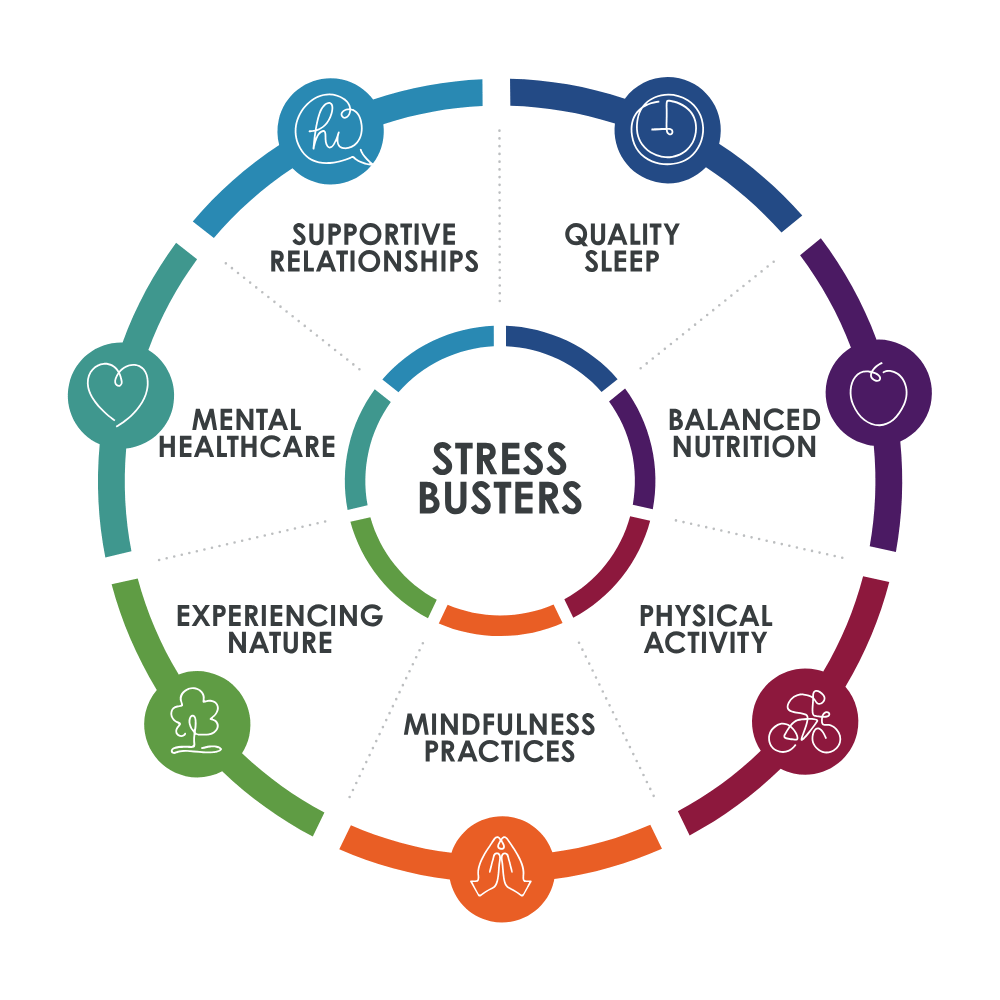Stress Busters Resources for Professionals | General

A list of general Stress Buster resources for health care professionals and community-based organizations.
See CBO toolkit for additional resources by Stress Buster.
ACEs Aware RESOURCES
Visit the Stress Busters Toolkit for Community-Based Organizations for information, skills, and resources to help clients prevent and heal toxic stress.
Visit the ACEs Aware Manage Stress website for patient-facing Stress Buster resources, including patient handouts.
To learn about Adverse Childhood Experiences (ACEs), toxic stress, trauma-informed care, visit the ACEs Aware website.
Visit the ACEs Aware Learning Center to learn ways to incorporate trauma-informed approaches into your daily work and organizational programming.
LEARN MORE ABOUT A TRAUMA-INFORMED APPROACH
TRAUMA-INFORMED TECHNIQUES FOR TALKING ABOUT STRESS, TRAUMA, AND STRESS BUSTERS
- Listen Partner Connect Framework (ACEs Aware Stress Busters Toolkit for Community-Based Organizations)
- Active listening
- Active listening (ACEs Aware Stress Busters Toolkit for Community-Based Organizations)
- Active listening (Greater Good in Action)
- Simple & Complex Reflections Good Practice (5-minute video)
- Motivational interviewing
- Motivational interviewing (ACEs Aware Stress Busters Toolkit for Community-Based Organizations)
- The Stages of Change (Social Work Tech blog, Prochaska & DiClemente)
- Motivational Interviewing & Scaling Questions (5-minute video)
- Motivational Interviewing Example – Interaction in Shelters (10-minute video)
- Research article by Cole, et al.
- Motivational Interviewing Network of Trainers (MINT) website
- Motivational Interviewing Benchcard (Veterans Affairs (VA))
- 3 Brief Intervention Tasks – FLO (Veterans Affairs (VA))
- Leveling power differentials
- Leveling power differentials (ACEs Aware Stress Busters Toolkit for Community-Based Organizations)
- “The “Handling” of power in the physician-patient encounter: perceptions from experienced physicians” (Laura Nimmon & Terese Stenfors-Hayes 2016)
- “The Power Differential and Why It Matters So Much in Therapy” ( Cedar Barstow 2015)
WAYS TO EXPLAIN ACES, TRAUMA, AND HEALTH TO PATIENTS OR CLIENTS
- “Flipping your lid” (ACEs Aware Stress Busters Toolkit for Community-Based Organizations)
- Hand model of the brain in action video (Emotion Coaching UK)
- Dan Siegel’s “Flipping Your Lid:” A Scientific Explanation (Dalai Lama Center for Peace and Education)
- Window of tolerance (ACEs Aware Stress Busters Toolkit for Community-Based Organizations)
- How to Help Your Clients Understand Their Window of Tolerance (National Institute for the Clinical Application of Behavioral Medicine (NICABM))
- Safety card and handout (in English and Spanish) for farmworkers and their families that describes the impacts of childhood adversity and how to build resilience (Project NACEs, Futures Without Violence)
TECHNIQUES FOR SUPPORTING PEOPLE DURING A STRESS RESPONSE
- Techniques to calm the stress response (ACEs Aware Stress Buster CBO Toolkit)
- Grounding techniques (Cal Poly)
- 10 Breathing Exercises to Try When You’re Feeling Stressed (Healthline)
- Breathing exercises (American Lung Association)
- Breathing Exercises (Be Well at Work, UC Berkeley)
- Diaphragmatic breathing (Cleveland Clinic)
- Loving-Kindness Meditation (Greater Good in Action)
- Loving-Kindness Meditations for Beginners (mindful)
- Regulate, Relate, Reason (Sequence of Engagement): Neurosequential Network Stress & Trauma Series (Dr. Bruce Perry)
- To identify triggers, problem-solve, and prevent future activation of the stress response, consider Collaborative Problem Solving (Lives in the Balance)
BUILD A COMMUNITY NETWORK OF CARE
- The Trauma-Informed Network of Care Roadmap: A Guide for Strengthening Community Relationships (ACEs Aware)
- UCLA CENTER FOR HEALTH POLICY RESEARCH Section 1: Asset Mapping
GET COMMUNITY PERSPECTIVES AND INPUT
- Community Advisory Boards in Community-Based Participatory Research: A Synthesis of Best Processes (Center for Disease Control and Prevention)
- Community Engagement Toolkit (UCSF)
- Form a Youth Advisory Board to get input about mental healthcare programs and services from youth (SAMHSA)